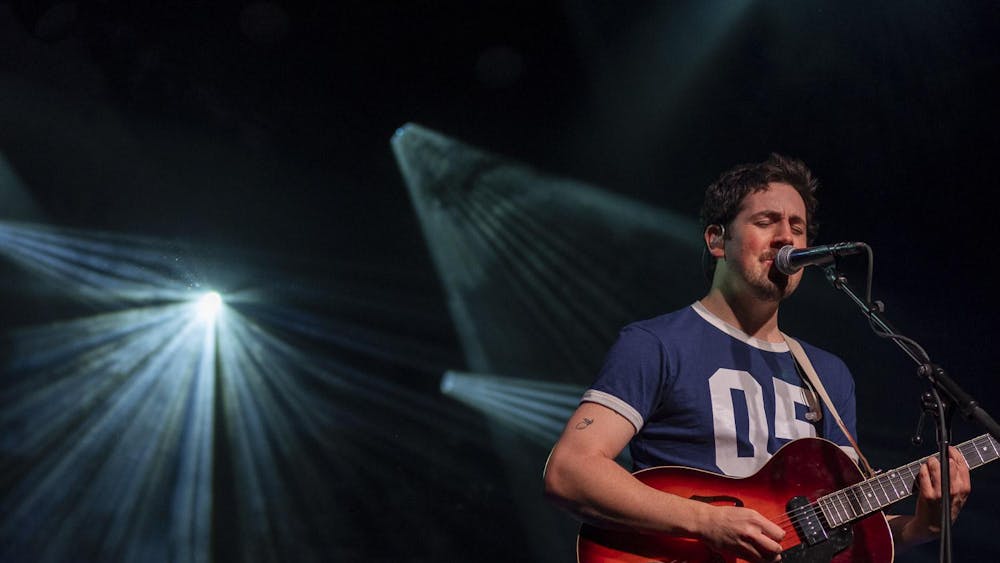High school theater is going off the rails, teenagers have turned into neo-Nazis and Britain is overridden by anti-immigrant sentiment. Without garishly patterned clothes, only the widespread and vicious homophobia in east London would distinguish 1979 from today. Based on the best-selling British novel by Terry Ronald, “Becoming Nancy” explores how a gender-blind casting of a school production of “Oliver!” ripples across a suburban London community and forever changes the life of David Starr (Zachary Sayle), who is cast as the female lead, Nancy. Showing at the Alliance Theatre until Oct. 6, this coming-of-age musical comedy wins audiences over with lots of laughs and big dance numbers, even though the ending falls short.
In “Becoming Nancy,” David quickly commits to becoming the best Victorian harlot he can be, accepting that the show must go on when none of the girls have the vocal range to belt out Nancy’s big numbers. However, the bullies who hurl homophobic slurs at David and racist insults at his best friend, Francis Bassey (Jasmine Rogers), are determined to cut David and Francis down. Luckily, the easygoing jock Maxie Boswell (Jake Boyd), cast as Nancy’s ruffian husband, Bill Sikes, seems quite pleased to act alongside David. Practicing for the show, David and Maxie learn considerably more than their lines. Despite the premise of “Becoming Nancy,” familiarity with the musical “Oliver!” is not necessary to enjoy the performance, although reading the Wikipedia summary and watching some show clips may help you catch some references.
Humorous highlights of the show include a ridiculous handjob and an advice-giving Greek chorus, made up of imaginary versions of Sting, Debbie Harry and Kate Bush. If you do not recognize those throwback 1970s singers, fear not. I missed the references and was still in stitches. Wonderfully, the writer, Elliot Davis, does not take the low-hanging and problematic comedic route of boy-in-a-dress-based jokes (I’m looking at you,“Tootsie”). In fact, “Becoming Nancy”does well by its young gay protagonist. While there are jokes that play off of stereotypes of gay men, they are more often tongue-in-cheek references recognized by the community rather than the limp-wrist caricatures of past musical comedies (i.e. “The Prom” at the Alliance Theatre in 2016). Sayle plays David winningly and ensures that we laugh with David.
Racism, the second hot-button issue in “Becoming Nancy,” is handled less deftly. This is no dog-whistle racism; militant chants of “Keep Britain White” echo in a menacing first-act number. The violence of racism sobers “Becoming Nancy,” yet Davis’ book refuses to meaningfully engage it. Vicious hate is remedied so quickly and easily in “Becoming Nancy” that the real-life problem seems trivialized, even within the context of a musical comedy.
The choreography, by two-time Tony Award-winner Jerry Mitchell, is high energy and lots of fun, but what else would we expect from the man behind the 2010 revival of “La Cage aux Folles” and“Kinky Boots”? The lighting and set design also deserve a shout-out, especially for their effective use of shadow theater, where actors perform spotlit behind a translucent screen.
The lyrics and music, by Anthony Drewe and George Stiles, respectively, are generally strong, although the saccharine Act One ballad, “Six Inches From Your Heart,” brought the show’s strong momentum to a dead standstill. “You Matter,” the Act Two song intended as an inspirational showstopper, also demands revision. The message is trite and, more crucially, a poor fit for the conflict of the show. If the lyrics must invoke a cliche motivational slogan for the chorus, at least choose one that fits David’s character arc, like “Be Yourself.”
The first three-quarters of the show are well done enough to command a New York or London stage. However, the climax through the conclusion fail to deliver the resolution or growth initially promised. Put briefly, the ending of “Becoming Nancy” is too much of everything. It has too many just-in-time cliches, all of which are predictable but only one of which is necessary. There are two unearned redemption arcs, both of which were hastily built into the second act after no foreshadowing and which resolve within minutes of each other.
The resolution is also far too tidy for this coming-of-age story. Trying to quickly resolve the problems of systemic and deep-rooted racism and homophobia does “Becoming Nancy” a disservice. Similarly, although this show is set in the 1970s, it’s performed in 2019; women do not need to be paired off with men to have satisfying narrative arcs. And leave David with some problems or heartache — he’s only 17 after all! He has time to grow.
“Becoming Nancy” is a fun and high-quality piece of theater. With a bit of revision it could even be great theater. As you watch the musical, I hope you remember that this is its world premiere and the beginning of its story. Perhaps a revised “Becoming Nancy” will one day grace another stage, but regardless of its future, the opportunity to see a new original musical is a gift to Atlanta audiences.
What: Becoming Nancy
Where: Alliance Theatre
When: Now - Oct. 6
Tickets: $10 student rush tickets available on the day of performance. They must be purchased in person from the Woodruff Arts Center Box Office. Call ahead for availability at 404-733-5000.









